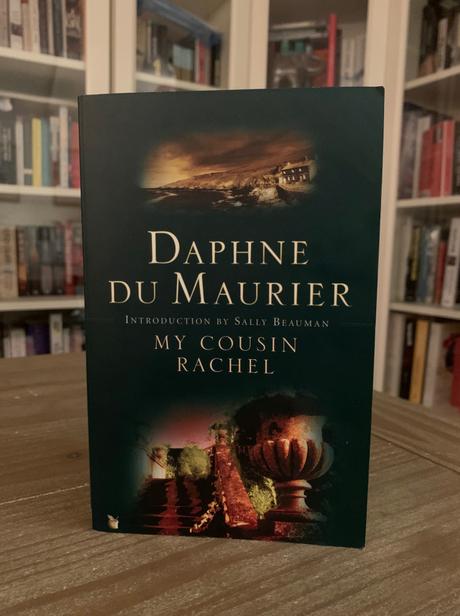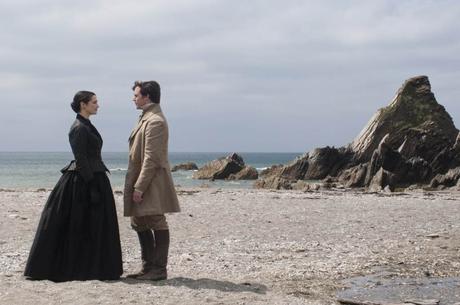 2003 Virago paperback
2003 Virago paperback I first read this in 2014, which seems like a lifetime ago, and decided to re-read it earlier this year when I was fed up with everything I had on my bookshelves. At some point I put it aside, and I left it for so long, I'm not sure why, that I literally forgot I was reading it. Then a week or so ago I remembered and picked it up again, and tore through the rest of it. I wish I'd read it all in one go back in May, but regardless I am very glad that I chose to read it again. Simply put, My Cousin Rachel is a masterpiece in narrative structure and characterisation, and possibly one of the best books I've ever read (a bold claim, I know). I initially read it after being equally stunned by Rebecca, and while this has some common elements (most notably the isolated Cornwall setting into which a vulnerable woman enters) it is very much its own beast and deserves to be lauded just as much as the most famous of du Maurier's books.
I have the 2003 Virago paperback edition and it contains a wonderful introduction by Sally Beauman (that is rife with spoilers, like this review), which I'm very glad I re-read as well. It points out that My Cousin Rachel could arguably be du Maurier's most feminist novel, and honestly I hadn't thought about it that way before now. Firstly because I don't think I thought that deeply about the novel the first time around, and also because I naively thought it was very 'male' given then it has a male narrator and Rachel in many ways fulfils a lot of negative stereotypes about women. But reading the book again, and thinking about it with a little more consideration, I think I could agree. Philip Ashley may be a male narrator, and may spout a lot of small-minded misogynist bollocks, but you have to remember that the book is written by a woman, a woman who was 100% a feminist and who loved to play with and explore conventional gender roles. du Maurier uses Philip's insular life and very specific mindset to toy with the expectations he imposes on both himself and others about lifestyle, behaviour, attitude, and the role we play in society.
As you read the novel it's very easy to get caught up in Philip's view of things, but it makes a huge difference if you are able to then take a step back and see beyond his opinion and perspective, to see what others might think or do. Crucially it helps to step back and try and see things from Rachel's point of view and indeed from that of Louise, Philip's childhood friend and the daughter of his godfather. Louise is basically the only woman Philip has known in any real way his entire life and I think that while biased (in my opinion she is in love with him), she is very clever and analytical, and her view on the situation is incredibly important to consider. I find her character quite fascinating. Philip has known her his entire life, and yet he is continually amazed (surprised) by her intellect and insight, and despite belittling her he does actually seem to respect her and value her friendship, and perhaps even her insight. Alone in the world after Ambrose's death, he turns to Louise late in the novel when he really needs help. Louise matters because not only does she know Philip well, she is in the unique position of being the only woman close enough to the situation to see what might really be happening between him and Rachel, and because they are so familiar she is able to be quite open and honest with Philip, when everyone else stays in their lane. While her father, as Philip's guardian, tries to reason with him but only goes so far, Louise give lots of knowing sympathetic looks and tries to connect with Philip whenever possible.
After watching the 2017 film adaptation, right after finishing my re-read, I had a lot more appreciation for Louise. At first I was apprehensive about how much more involved they made Philip and Louise's relationship in the film (she is present more often, and they are more informal and even tease each other), but I think the slight change actually worked very well to demonstrate the often unspoken or undemonstrated closeness that Philip and Louise actually share in the novel. I think Philip does not acknowledge to himself how he might really feel about Louise, whether romantic or not, in the novel. She is part of his familiar life, his safe little world, and he puts her in a safe little box. This is part of why he is so disarmed by Rachel when they finally meet - not only is she nothing like what he imagined, she is also completely different from every other woman he has come across (in his view at least). His deep, perhaps unexplored, emotions about Ambrose's death and her role in his life mean that she opens him up in a way that no one ever has before. His is shocked and completely broken down by her charm, and utterly beguiled.

The intensity of Philip's unexplored feelings about Ambrose dying so far away from home, and his anger at Rachel before they meet, mean that is already sort of obsessed with her before she arrives at the house and this only gets worse once he sees her. It's easy to forget that he is without Ambrose for the first time in his life, and perhaps as a result of this he directs all of his feelings, both positive and negative, towards Rachel. All the way through the novel I think he both loves and hates her in his own way, and he goes a little mad - mad with desire and love, and then mad with jealousy and suspicion. And all the while he wants to understand her, to know her, and I think for her to know him. For all his (great) faults and sexism, I really do feel for Philip. He is the product of his very particular life and circumstance, and while being very sure of himself he is really very sheltered and repressed - and knows nothing about love and pain.
Rachel, conversely, knows a lot about pain. We hear a little about her tumultuous life before she met Ambrose, which sounds stressful enough, and then once she meets someone she really does seem to connect with, it all goes wrong. The first time I read the book I forgot the detail, mentioned in one letter and then discussed once later on, that during her marriage to Ambrose, Rachel loses a child a few months into the pregnancy. I think possibly now because I have a child of my own, this fact gained significance for me this time around. I can't imagine the pain (both physically and psychologically) she must have gone through, miscarrying and having to give birth - and in a time before modern medicine. Rachel expresses a little of her pain around this to Philip, but it's mostly framed by the fact that this was a turning point in her relationship with Ambrose, when she says he "lost faith" in her and things started to fall apart. Certainly in his letters to Philip we see that Ambrose began to feel more distant from Rachel after this loss, and while he must have been hurt by it too, he clearly doesn't feel the same pain as her. She must have been completely devastated - and then for her husband to "lose faith" in her as well, must have been utterly soul-destroying. And then her husband dies. No wonder she warms to Philip as she does, and yet remains hesitant with her feelings. She is in a very vulnerable and precarious position when she comes to England, and seeing her through this framework makes her a lot more sympathetic to the reader.
Even if she does dabble in poison.
Ah yes, the possible poisonings... this is such an interesting element of the story. Not only does it add a layer of mystery and intrigue to Ambrose's death and Rachel's morals/motives with Philip, it also adds a brilliantly witchy element to her character. Throughout the history of witchcraft folklore, tea has been a symbol of that feminine, witchy power - literally a witch's brew. Rachel brings herbs with her from Italy to make 'tisana', herbal teas, that she makes at home but also gives to people on the estate as home remedies. Philip teases her for this, saying that people will call her a midwife or a wise woman, and chooses to see it as rustic and 'foreign', but ultimately harmless. It's only when he learns more about laburnum, and finds the lost letter from Ambrose, and after he himself is ill, that he starts to see her tisana a little differently. This reminded me a bit of the role of the tea in Lady Audley's Secret, and while in that story there is no hint of poison, in both stories the mysterious woman makes tea for her guests in a strange and beguiling way that is used as a signal of her possibly threatening nature, and ultimately unknowable inner self. In many ways Rachel is a witch to Philip - she bewitches him with her charm, makes strange tea, and is a manifestation of all his fears and prejudices about women; and he is completely infatuated with her.
If you loved the novel I would really recommend the 2017 film. While there are a few logistical differences (like the exclusion of Rachel's garden and the different location for her last scene), the only other major change was that in the film Rainaldi is revealed to be gay for some reason (it doesn't add anything and in fact removes some of the ambiguity of his relationship with Rachel that I think is the point). Otherwise it's very faithful to the book, especially in the atmosphere and setting, which is very beautiful, and I think the core cast were excellent. All the repressed Victorian emotions in the book, woven into Philip's words, are beautifully demonstrated in the film and it was incredible to see the novel come to life in such a brilliant way (the underlying eroticism in the book is also a lot more obvious in the film, even including a second slightly gratuitous sex scene that isn't in the book). Rachel Weisz and Sam Claflin are perfectly cast, from their looks and age difference to their temperaments and chemistry. Well worth a watch - after you've read the book.
*
Originally published by Gollancz in 1951. I read the 2003 Virago Books paperback, pictured above.
